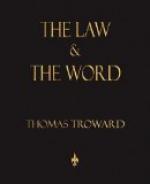The writer was struck by the apparent parallelism of these two distinctly dissimilar philosophies, and mentioned the discovery to Judge Troward who naturally expressed a wish to read Bergson, with whose writings he was wholly unacquainted. A loan of Bergson’s “Creative Evolution” produced no comment for several weeks, when it was returned with the characteristic remark, “I’ve tried my best to get hold of him, but I don’t know what he is talking about.” I mention the remark as being characteristic only because it indicates his extreme modesty and disregard of exhaustive scientific research.
The Bergson method of scientific expression was unintelligible to his mind, trained to intuitive reasoning. The very elaborateness and microscopic detail that makes Bergson great is opposed to Judge Troward’s method of simplicity. He cared not for complexities, and the intricate minutiae of the process of creation, but was only concerned with its motive power—the spiritual principles upon which it was organized and upon which it proceeds.
Although the conservator of truth of every form and degree wherever found, Judge Troward was a ruthless destroyer of sham and pretence. To those submissive minds that placidly accept everything indiscriminately, and also those who prefer to follow along paths of well-beaten opinion, because the beaten path is popular, to all such he would perhaps appear to be an irreverent iconoclast seeking to uproot long accepted dogma and to overturn existing faiths. Such an opinion of Judge Troward’s work could not prevail with any one who has studied his teachings.
His reverence for the fundamental truths of religious faith was profound, and every student of his writings will testify to the great constructive value of his work. He builded upon an ancient foundation a new and nobler structure of human destiny, solid in its simplicity and beautiful in its innate grandeur.
But to the wide circle of Judge Troward’s friends he will best and most gloriously be remembered as a teacher. In his magic mind the unfathomable revealed its depths and the illimitable its boundaries; metaphysics took on the simplicity of the ponderable, and man himself occupied a new and more dignified place in the Cosmos. Not only did he perceive clearly, but he also possessed that quality of mind even more rare than deep and clear perception, that clarity of expression and exposition that can carry another and less-informed mind along with it, on the current of its understanding, to a logical and comprehended conclusion.
In his books, his lectures and his personality he was always ready to take the student by the hand, and in perfect simplicity and friendliness to walk and talk with him about the deeper mysteries of life—the life that includes death—and to shed the brilliant light of his wisdom upon the obscure and difficult problems that torment sincere but rebellious minds.
His artistic nature found expression in brush and canvas and his great love for the sea is reflected in many beautiful marine sketches. But if painting was his recreation, his work was the pursuit of Truth wherever to be found, and in whatever disguise.




